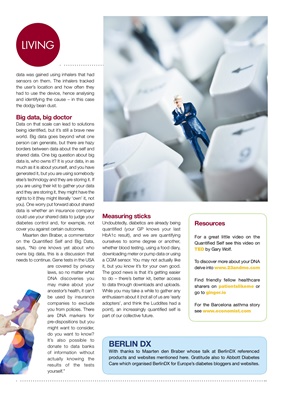
LIVINGLIVING
BERLIN DX
With thanks to Maarten den Braber whose talk at BerlinDX included the products
and websites referenced in this article. Gratitude also to Abbott Diabetes Care
which organised BerlinDX for Europe's bloggers and diabetes websites.
data was gained using inhalers that had
sensors on them. The inhalers tracked
the user's location and how often they
had to use the device, hence analysing
and identifying the cause - in this case
the dodgy bean dust.
Big data, big doctor
Data on that scale can lead to solutions
being identified, but it's still a brave new
world. Big data goes beyond what one
person can generate, but there are hazy
borders between data about the self and
shared data. One big question about big
data is, who owns it? It is your data, in as
much as it is about yourself, and you have
generated it, but you are using somebody
else's technology and they are storing it. If
you are using their kit to gather your data
and they are storing it, they might have the
rights to it (they might literally 'own' it, not
you). One worry put forward about shared
data is whether an insurance company
could use your shared data to judge your
diabetes control and, for example, not
cover you against certain outcomes.
Maarten den Braber, a commentator
on the Quantified Self and Big Data, says,
"No one knows yet about who owns
big data, this is a discussion that needs
to continue. Gene tests in the USA are
covered by privacy laws, so no matter
what DNA discoveries you may make
about your ancestor's health, it can't be
used by insurance companies to exclude
you from policies. There are DNA markers
for pre-dispositions but you might want
to consider, do you want to know? It's
also possible to donate to data banks of
information without actually knowing the
results of the tests yourself."
Measuring sticks
Undoubtedly, diabetics are already being
quantified (your GP knows your last
HbA1c result), and we are quantifying
ourselves to some degree or another,
whether blood testing, using a food diary,
downloading meter or pump data or using
a CGM sensor.
You may not actually like it, but you
know it's for your own good. The good
news is that it's getting easier to do -
there's better kit, better access to data
though downloads and uploads. While
you may take a while to gather any
enthusiasm about it (not all of us are 'early
adopters', and think the Luddites had a
point), an increasingly quantified self is
part of our collective future. You will have
to quantify for yourself how far you (and
your diabetes data) want to take part in it.
Resources
For a great little video on
the Quantified Self see this
entry on TED. To discover
more about your DNA delve
into www.23andme.
com. Find friendly fellow
healthcare sharers on www.
patientslikeme.com or go to
ginger.io. To read more about
the Barcelona asthma story see
www.economist.com